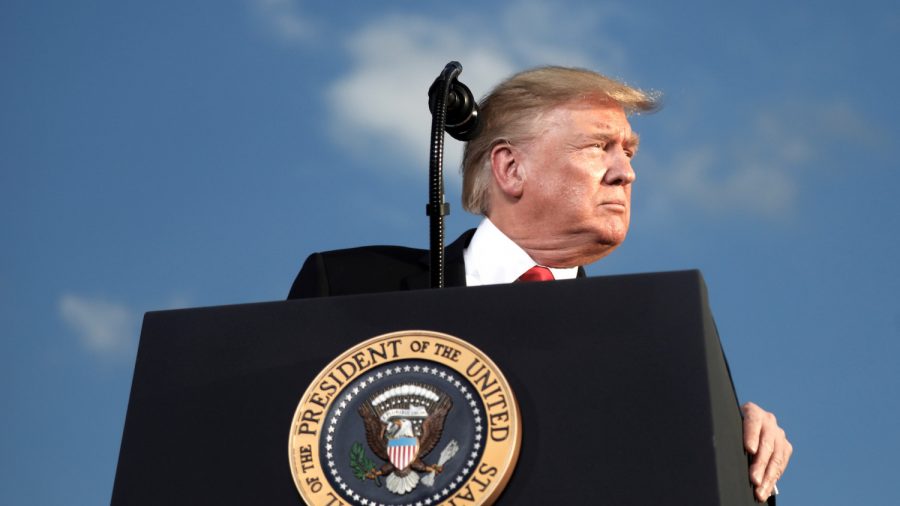The Democratic-controlled New York State Assembly and Senate have passed bills that will allow U.S. congressional committees to access President Donald Trump’s state tax returns.
The bill, dubbed by Democrats as the TRUTH Act, passed in the on May 22, lifting an existing state restriction on releasing the tax returns of individuals elected into public office, including the president of the United States.
The #NYSAssembly has just passed the first part of the TRUST Act, my bill with @bradhoylman to shed light on the tax returns of public officials pic.twitter.com/giliwjEaJS
— David Buchwald (@DavidBuchwald) May 22, 2019
The bill now goes to Democratic Governor Andrew Cuomo for final approval.
Once approved, the state Department of Taxation and Finance can share the state tax return information with three congressional committees upon request: the House Ways and Means Committee, the Finance Committee, or the Joint Committee on Taxation.
According to the bill, congressional committees can only request state tax returns information after they fail to gain access to federal tax returns through the U.S. Treasury Department.
Also, if Congress does request and obtain Trump’s state tax returns, the information will not be released to the public. Under federal law, the confidential information in the returns is only for the committees to view.
The move comes days after U.S. Treasury Secretary Steven Mnuchin refused to comply with a congressional subpoena for Trump’s federal tax returns.
According to Reuters, much of the information submitted in New York state tax returns is similar to that on federal forms. Trump’s personal home and the headquarters for his business are located in New York.
Signing my tax return…. pic.twitter.com/XJfXeaORbU
— Donald J. Trump (@realDonaldTrump) October 15, 2015
A sponsor of the bill, Senator Brad Hoylman, said: “New York has a unique role to help head off the constitutional crisis brewing between Congress and the White House over refusal to comply with the request for Donald Trump’s tax returns,” according to the Times-Union.
Earlier versions of the bills in the New York State Senate and Assembly allowed for the request of any New York resident’s tax returns, but on May 19, amendments were passed to narrow the scope to certain categories, including elected officials, entities controlled by elected officials, and certain policymakers, according to the Times-Union.
Criticisms
New York Republicans who opposed the bill called the legislative action an abuse of power that fed into the political designs of Democrats in Washington, the Albany Times-Union reported.
New York Republican Party Chairman Ed Cox slammed the bill when it first passed the state Senate on May 8, saying in a statement to Fox News: “The Democratic legislature and Governor Cuomo are suffering from Trump Derangement Syndrome and playing politics at the expense of doing the people’s business.”
Sen. Jim Tedisco, R-Glenville, called the legislation a “sad attempt to illegitimize an election and a president,” according to the Times-Union.
“What’s the next step? Because this isn’t going to end,” Tedisco said.
.@NikkiHaley in 2012 w/ Romney on tax returns????(political ploy.) Fast forward..2016 w/ Robot Rubio????#FAIL????#Politician pic.twitter.com/Kxe5AKaTQD
— Dan Scavino (@DanScavino) March 1, 2016
“After you get his taxes, you’re going to want to get his number of suits he has and where he buys them and the cost of them and what he did in the kindergarten.”
Dems Also Seeking Trump’s Federal Tax Returns
On May 17, Mnuchin refused to comply with a congressional subpoena and rejected a request from House Ways and Means Committee Chairman Richard Neal, a Democrat, to access Trump’s federal tax returns.
Neal’s committee is empowered to request tax returns for a valid legislative purpose. Mnuchin said the subpoena lacked that “legitimate legislative purpose” and leaving the president entitled to keep his tax returns private.
Neal’s request is one of a battery of efforts by Democrats to target Trump legitimacy in the public eye, all initiated after they gained control of the House of Representatives in the 2018 midterm election. Trump refers to these efforts as “presidential harassment.”
The Democrats are getting ZERO work done in Congress. All they are focused on is trying to prove the Mueller Report wrong, the Witch Hunt!
— Donald J. Trump (@realDonaldTrump) May 22, 2019
PRESIDENTIAL HARASSMENT!
— Donald J. Trump (@realDonaldTrump) May 22, 2019
Mnuchin’s rejection sets up a potential federal court battle that could drag on for months.
The Epoch Times’ reporter Ivan Pentchoukov and Reuters contributed to this report.

